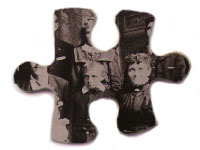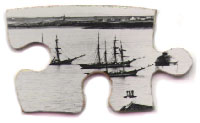



Caithness Archives
'Zulu' - the Caithness connection
Stephen Cashmore describes how a Caithness soldier, Private Hector Grant, became caught up in the dramatic events surrounding Rorke's Drift during the Zulu War.
There must be few folk who have not heard of Rorke's Drift, One hundred and thirty-nine British soldiers against 4000 Zulu warriors, fresh from a stunning victory at the battle of Islandhlwana. Eleven Victoria Crosses, immortality, an ever-popular film; the very essence of heroism, and time, political revisionism and historical research have not diminished this glory.
One thing, which may be unfamiliar to our readers, is a little-known Caithness connection with Rorke's Drift.
The series of 19th-century wars waged by the British in South Africa were inspired by three great historical motivators: gold, diamonds and greed. The Boer farmers were the natural enemies of the financier-backed British, but there was another military power ranged against these European interlopers -- the Zulus, From the time that the great Shaka became their ruler in 1818, the Zulus had been an efficient, disciplined and all conquering military nation.
Their motto 'To Conquer or to Die" sums up the Zulu military-ethos. Defeated warriors were put to death, enemies were ruthlessly massacred, and every able male was, without exception, a warrior. By 1872, when Cetshwayo became their king, the Zulus controlled over 20,000 square miles of southern Africa, their empire was expanding, and confrontation with the British seemed inevitable.
When the Zulu War broke out in January 1879, the British sent a force of some 16,000 men into Zulu territory under the command of Lord Chelmsford. The majority of these troops were Natal natives; of regular British soldiers there were only 5400.
Among the ranks of British regulars was a Private Hector Grant. Private Grant's regiment was the 1/24th (2nd Warwickshire) but he was a native of Latheron. Just how someone from the Far North found himself in the Warwicks is uncertain, but it was not unusual for men to enlist in units whose nominal home was many miles away.
Whatever the reason, on January 22 private Grant was serving with a rocket battery under a Colonel Durnford's. At around 10.30am Colonel Durnford's detachment arrived at Islandhlwana, a rocky outcrop commanding an extensive view of a wide plain, where 1800 men were camped. This force was part of Lord Chelmsford's invading army which the commander had divided into three columns.
A group of Zulus was sighted in the distance. Although Colonel Durnford was in charge of the Islandhlwana camp, he chose to ride out with a rocket battery in pursuit of the Zulus. Private Grant was a member of this battery.
The British soldiers chased the retreating Zulus to a ridge where they disappeared. Reaching the brow of the ridge, Durnford's men saw a sight to freeze the blood - in a ravine 20,000 Zulus were squatting in silence. Durnford was brave but he was no fool; he realised his main duty was to inform the camp at Islandhlwana.
But as Durnford's detachment withdrew, the Zulus swarmed after them. Soon the rocket battery was embroiled in a desperate hand-to-hand struggle. From the camp at Islandhlwana the rest of Durnford's force dashed out to join the fight but, despite that courage which came from the sure knowledge that the Zulus took no prisoners, the British soldiers were overwhelmed by sheer numbers and wiped out to a man.
Some 1200 men were massacred with ruthless savagery by their Zulu antagonists. The rest, including Colonel Durnford's party, fled, pursued by the victorious Zulus for some four miles. In the confusion that followed the Islandhlwana disaster, Durnford's troop became split up. Some lost their bearings, wandered aimlessly and were killed by roaming bands of Zulus; others sought shelter in hiding; a few made their way towards Rorke's Drift, a British post on the Buffalo River.
By the time Hector Grant arrived at Rorke's Drift he had lost most of his equipment and his morale was, understandably, at a very low ebb. In vain he tried to warn the Rorke's Drift garrison of the terrible danger they were in. They ignored his warning and, perhaps realising the effect a demoralised soldier can have on his fellow troops, sent Private Grant to Helpmekaar where there was a detachment of British troops under Major Spalding.
But Major Spalding had already been appraised of the danger to Rorke's Drift and was leading two companies there. About three miles from his destination Major Spalding met some of the fugitives heading towards Helpmekaar, among them Private Grant. These men the Major ordered to join him and return to Rorke's Drift.
A mile further on, Spalding's troop noticed an ominous column of black smoke rising into the blue African sky. A moment later two more fugitives appeared with a report that the post at Rorke's Drift had fallen to the Zulus. The logic of the situation seemed irrefutable: Major Spalding took his two companies, Private Hector Grant included, back to Helpmekaar, certain that the little garrison at Rorke's Drift had all perished. The truth was dramatically different, however, and Spalding's retreat from Rorke's Drift may, perhaps, have denied Caithness a Victoria Cross.
I would like to thank Thurso's David Bews, a tireless researcher into the military history of the North, for contributing the information on which this article is based.
One final thought -- are there any descendants of Hector Grant reading this?
Steven Cashmore 1998
![]()
Information contained on this page may only be used for
personal use,any request for full or part publication must be
carried out through the Highland archive.
Send information for these archives to william@caithnessarchives.org.uk